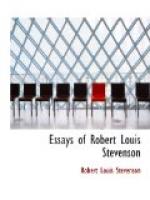FIRST PAPER
[Note 1: Sir, we had a good talk. This remark was made by the Doctor in 1768, the morning after a memorable meeting at the Crown and Anchor tavern, where he had been engaged in conversation with seven or eight notable literary men. “When I called upon Dr. Johnson next morning,” says Boswell, “I found him highly satisfied with his colloquial prowess the preceding evening. ‘Well,’ said he, ‘we had good talk.’ BOSWELL: ‘Yes, sir, you tossed and gored several persons.’”]
[Note 2: As we must account. This remark of Franklin’s occurs in Poor Richard’s Almanac for 1738.]
[Note 3: Flies ... in the amber. Bartlett gives Martial.]
“The bee enclosed and through the
amber shown,
Seems buried in the juice which was his
own.”
Bacon, Donne, Herrick, Pope and many other authors speak of flies in amber.]
[Note 4: Fancy free. See Midsummer Night’s Dream, Act II, Sc. 2.
“And the imperial votaress passed
on,
In maiden meditation, fancy-free.”
This has been called the most graceful among all the countless compliments received by Queen Elizabeth. The word “fancy” in the Shaksperian quotation means simply “love.”]
[Note 5: A spade a spade. The phrase really comes from Aristophanes, and is quoted by Plutarch, as Philip’s description of the rudeness of the Macedonians. Kudos. Greek word for “pride”, used as slang by school-boys in England.]
[Note 6: Trailing clouds of glory. Trailing with him clouds of glory. This passage, from Wordsworth’s Ode on the Intimations of Immortality (1807), was a favorite one with Stevenson, and he quotes it several times in various essays.]
[Note 7: The Flying Dutchman. Wagner’s Der Fliegende Hollaender (1843), one of his earliest, shortest, and most beautiful operas. Many German performances are given in the afternoon, and many German theatres have pretty gardens attached, where, during the long intervals (grosse Pause) between the acts, one may refresh himself with food, drink, tobacco, and the open air. Germany and German art, however, did not have anything like the influence on Stevenson exerted by the French country, language, and literature.]
[Note 8: Theophrastus. A Greek philosopher who died 287-B.C. His most influential work was his Characters, which, subsequently translated into many modern languages, produced a whole school of literature known as the “Character Books,” of which the best are perhaps Sir Thomas Overbury’s Characters (1614), John Earle’s Microcosmographie (1628), and the Caracteres (1688) of the great French writer, La Bruyere.]




